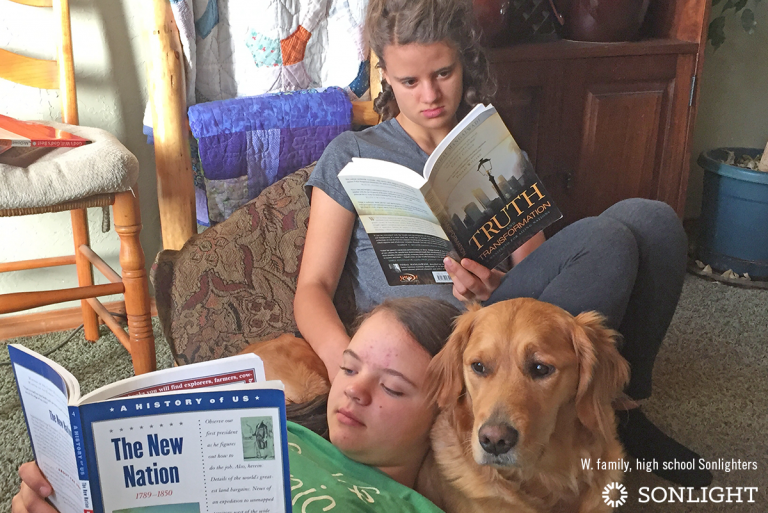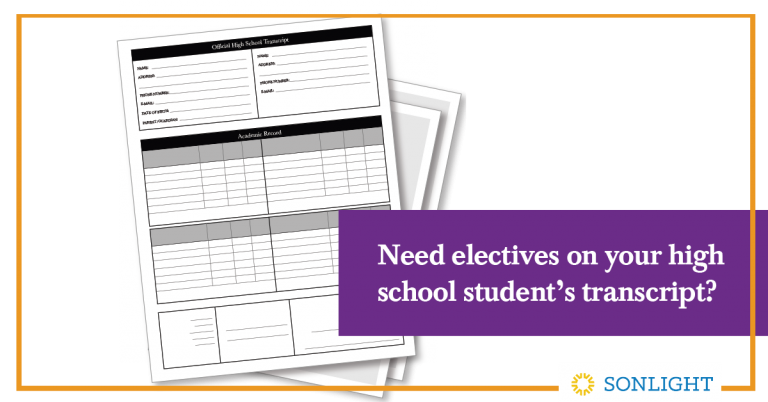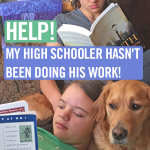
You know you’re a little behind in checking those Creative Writing assignments, but every day, your high schooler has his Sonlight Student Guide out, and a book in his face. You’ve seen him at the computer, day in and day out, as you’ve hustled a load of clean laundry from the dryer to the coach while simultaneously listening to your middle schooler read aloud. You know he’s working.
And then, you finally scrape together a moment of free time and pull out your own Instructor’s Guide. Things seem off. You compare week numbers, backtracking to find individual assignments. You’re concerned. Your concern turns to surprise, your surprise turns to shock, and just like that, the gig is up! Your high schooler is severely off track, and he didn’t clue you in.
Who is Responsible for the Lapse?
Your first reaction is probably to drag your teenager to the table and read him the riot act. And yes, it’s true that the burden for completing the workload suggested in the Student Guide falls on the student. Sonlight has taken the work out of planning high school— so much so that it’s tempting to hand over that guide and assume your kid has all the tools he needs to succeed at his disposal.
But no curriculum works in a vacuum. You’re not meant to shelve your own Instructor Guide and check out.
Instead, you’re meant to find freedom in giving your high schooler some independence to develop the skills of self-led learning… while providing much-needed accountability and support. So if you suddenly find that six weeks’ worth of reading has gone undone, the burden of responsibility is shared evenly between teacher and student.
What’s Missing from the Assignments?
Once you’ve gotten past the relational issues of realizing what’s happened (and don’t be fooled, it does feel relational!), it’s time to begin assessing what’s missing. Let the personal sense of indignation go and take inventory.
- Check everything.
- Compile a master list of assignments.
- Correct any work that’s been sitting in your To Do folder as well, making sure that it’s appropriate and done to your standards.
You may find that your high schooler has dropped only writing assignments or only chemistry. More often, this kind of slip will show up in multiple areas, so be thorough.
When Did The Missing Work Start?
A full accounting of missing work will often point succinctly to where the breakdown began, unless your child has been attempting to catch up and has filled in some of the gaps on his own. It might also show where you stepped back and lost track of progress— which will help with your next step.
Why Did the Lapse Happen?
Things were fine until
- the new baby was born
- your child started a new part-time job
- a new skill was introduced
- your family started volunteering at the senior center three days a week
Having an idea of where the break occurred makes understanding what happened that much easier. There could be learning issues, emotional needs that have to be addressed, or comprehension difficulties at work. Of course, all of this is assuming that there is a verifiable underlying cause.
Let’s get real: sometimes, the work has gone undone because your teenager simply didn’t want to do it, or because he has been wasting time elsewhere. Maybe you have a real reason, too, or maybe you’re just stretched thin and didn’t feel like you needed to check in. At any rate, it’s time for a hard conversation about priorities, follow through, and time management.
How Are We Going to Catch Up with Homeschool?
List in hand, it’s now time to take what you’ve learned and move to the action phase. Depending on the length of time this has been going on and the cause, you get to decide what's appropriate:
- Natural consequences time—your teen will do all the work, and he's done when he's done.
- Grace time—you decide to forgive a portion of the work, abridge assignments, or change the format in which the work must be completed.
Being aware of your state’s requirement for grading and graduation is important here. Come up with a plan, and support your student on a daily basis for the best results. Remember to address all the issues at play, and not just give a checklist of work. This is a great opportunity to mentor your older child through time management, minimizing distractions, and creating an effective work environment if those things haven’t yet been done in your homeschool.
At the end of the process, hopefully you will have guided your child through something much more formative and character-building than a punitive smackdown. Remember that, no matter how grown up those 15-, 16-, 17-, and 18-year-olds seem, they’re still works in progress. Using this lapse as part of their education and discipleship takes a potential failure and turns it into a valuable learning opportunity. Hold on to that, mom, and extend grace all around!









